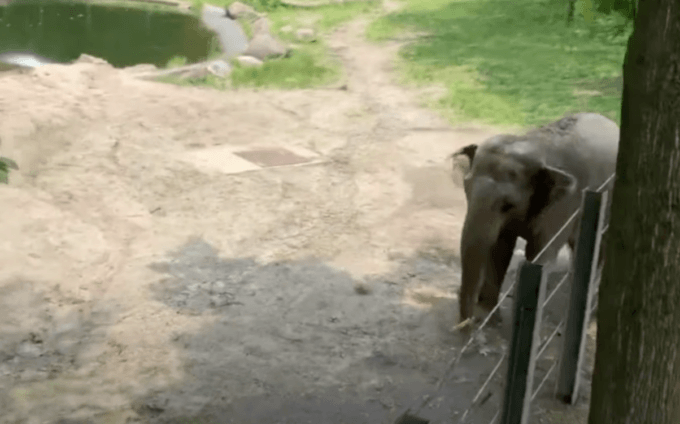
In a case recently appealed in the State of New York—Nonhuman Rights Project v. Breheny—a group of advocates led by Steven Wise has again challenged the confinement of an Asian elephant living at the Bronx Zoo. The case, which is being noted internationally and has received moral support from Harvard law professor Laurence Tribe, is a habeas corpus petition—a claim that a person is wrongfully detained. Should the tactic get the elephant moved from a zoo to a sanctuary, it would be, Wise says, a win for animal personhood.
Which is kind of an odd thing to say about a legal action to truck an elephant from one human keeper to another.
The Nonhuman Rights Project says the zoo’s pen is too small. I’m not brushing off the concern. A sanctuary is (or should be) better than a zoo. But if that’s the point, we’re talking about animal husbandry standards. Is that nonhuman personhood, or just a case of meet-the-new-boss? Focusing on a being in permanent captivity cannot help but make a problematic case for personhood.
Detangling Movements
Steven Wise compares cases for elephants and chimpanzees with actions to obtain recognition of non-whites as persons. Last month, Wise wrote an address noting that the Bronx Zoo had kept “Ota Benga, an African pygmy man” (a member of the Mbuti people taken from Colonial Congo) on display in 1906.
Human liberation movements and animal liberation are not the same. A case for legal personhood will inevitably draw from human-rights advocacy; and certainly there is continuity in the history of emancipation movements. Still, animal advocacy really is different.
When human slavery is legally abolished, those held in bondage and their descendants strive for civil rights. The end of their enslavement means, at least in theory, that a class of individuals can begin anew the struggle to reach their full potential within the culture of humanity.
Nonhuman beings need a different paradigm. Their own habitats and their own social networks make them who they are, who they evolved to be. We need an animal liberation movement that champions untamed animals’ interests in thriving independently of human supervision—while they can still live free lives.
The Way to Respect
As a law student, I wrote in support of expanding personhood to other-than-human animals. In my opinion, nonhuman personhood can exist in our legal framework. But over the years I have come to understand the advocacy quest from another perspective.
The more I learn about extinctions, and the delicate connections within biological communities, the more I believe nonhuman personhood fails animals. It’s making a claim to speak for them—rather than simply unhanding them.
I think nonhuman personhood ought to be folded into a movement to defend living beings in their original habitats, where they should live as they will. This would benefit entire biological communities that need us to stop breeding cattle, stop logging ancient forests, stop expanding roads and resorts, stop extracting everything we can get our drills into. The way to respect other animal life is to defend Earth’s remaining safe havens, and convert ranches, plantations, and other disturbed areas back to wildlands. For untamed animals living in freedom, our insistence that they keep what they have must be unequivocal and unrelenting.
Insofar as nonhuman personhood seeks both to stop captivity and protect habitat, then, it could help. But is that what this case is about?
Smarter Than the Average Elephant
Happy, the misnamed elephant, was born in 1971, then captured and dragged as a yearling to the United States, ultimately to wind up at the Wildlife Conservation Society’s Bronx Zoo in 1977.
Happy has passed a self-recognition test using a mirror. People who have a lot of faith in mirrors deem this test proof of unusual intelligence. But if anyone needs a break from being trained, assessed, and gawked at, it’s an elephant.
Nonhuman beings owe us no proof of anything. When we expect them to behave like us to qualify for legal rights, we display our own limitations. Rather than respecting a web of life we’ll never fully understand, we’re appealing to a love of hierarchy.
Granting relocation to an especially skilled elephant would not disrupt “the entire human-animal legal regime,” the litigants say. It’s high time that regime was disrupted. Which is why I’d like this case a lot better if it were about keeping an elephant free from capture in the first place. The zoo is, reportedly, already working on that. In 2006, the Wildlife Conservation Society announced it had stopped collecting elephants.
Compounding Crises
Humans are decimating the Earth’s untamed elephant population through deforestation, sprawl, hunting, and pharmaceutical control. Elephants have been found poisoned near Indonesian palm plantations. In Thailand, the place from which Happy was reportedly dragged away, elephants are captured, confined and trained to carry tourists or haul logs. And now, Earth’s dwindling community of naturally evolving animals is forced to cope with a human-driven climate crisis.
There’s a massive legal need here. And it has nothing to do with pinning rights to animals’ intelligence, or changing the circumstances of their confinement.
Nonhuman beings do not construct rights; we do. For them, our idea of personhood could be just another cage.
Citation: Nonhuman Rights Project, Inc. v. Breheny, 189 A.D.3d 583 (Dec. 17, 2020).